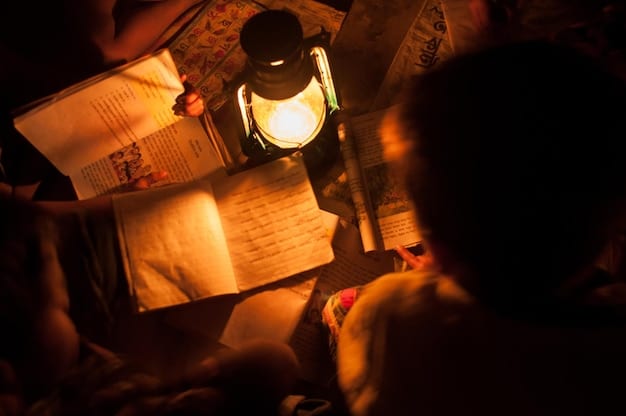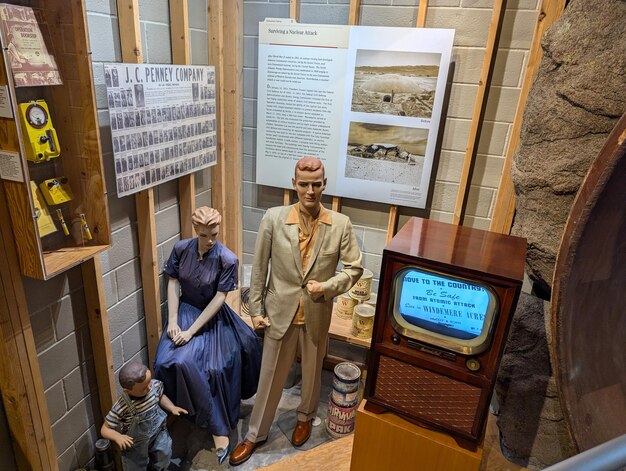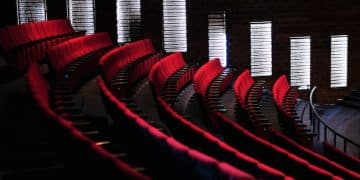Historical Accuracy in Period Dramas: A 2025 Controversy

The controversy surrounding historical accuracy in period piece dramas continues to be a significant debate in 2025, sparking discussions among historians, filmmakers, and audiences about the balance between entertainment and authenticity.
The depiction of historical events and figures in period dramas often sparks heated debates. In 2025, the controversy surrounding historical accuracy in period piece dramas: a 2025 debate is more relevant than ever, as audiences become increasingly discerning and demand authenticity alongside compelling storytelling.
The Evolving Landscape of Period Dramas
Period dramas have always captivated audiences with their lavish costumes, intricate set designs, and compelling narratives. However, as our understanding of history deepens and societal expectations shift, the criteria for what constitutes a “good” period drama are evolving. The debate now centers on the level of historical accuracy that viewers expect and whether creative liberties can be justified in the name of entertainment.
The Appeal of Historical Fiction
Historical fiction, at its best, can transport us to different eras, allowing us to experience the past in a vivid and engaging way. However, it is crucial to acknowledge that these stories are interpretations of history, not replicas. The question then becomes: where do we draw the line between artistic license and misrepresentation?
The Role of Filmmakers
Filmmakers face the challenge of balancing historical accuracy with the demands of storytelling. They must create narratives that are both informative and entertaining, while also staying true to the spirit of the era they are depicting. This balancing act often requires compromises, which can lead to criticism from historians and viewers alike.
- Authenticity in costume design and set decoration.
- Accurate portrayal of social customs and norms.
- Respectful representation of historical figures.
Ultimately, the success of a period drama depends on its ability to create a believable and engaging world, even if it does deviate from historical fact in certain areas. However, filmmakers must be transparent about these deviations and avoid perpetuating harmful stereotypes or misinformation.

Historical Accuracy vs. Dramatic License: A Delicate Balance
The heart of the controversy lies in the tension between historical accuracy and dramatic license. While some argue that period dramas have a responsibility to adhere strictly to the historical record, others believe that creative liberties are necessary to create compelling and engaging stories. Finding the right balance between these two opposing viewpoints is essential for the continued success and relevance of period dramas.
The Importance of Research
One of the key factors in determining the credibility of a period drama is the level of research that goes into its production. Filmmakers who take the time to consult with historians and experts are more likely to create a nuanced and accurate portrayal of the past. This research should inform every aspect of the production, from the script to the costumes to the set design.
The Impact of Creative Liberties
Creative liberties can be a valuable tool for filmmakers, allowing them to explore themes and ideas that are relevant to contemporary audiences. However, these liberties should be taken with caution, as they can easily distort the historical record and perpetuate harmful stereotypes. It is important for filmmakers to be transparent about the changes they have made and to provide context for viewers who may not be familiar with the historical period.
- Enhancing the emotional impact of the story.
- Exploring alternative interpretations of historical events.
- Making the story more accessible to modern audiences.
Ultimately, the decision of how much creative license to take is up to the filmmakers. However, they must be aware of the potential consequences of their choices and be prepared to defend their decisions to critics and viewers alike.
The Audience’s Shifting Expectations
In 2025, audiences are more informed and discerning than ever before. They have access to a wealth of information online and are more likely to question the accuracy of historical depictions in period dramas. This shift in audience expectations has put pressure on filmmakers to be more diligent in their research and more transparent about the creative liberties they take.
The Rise of Fact-Checking
The internet has made it easier than ever for viewers to fact-check the historical accuracy of period dramas. Online forums and social media platforms are filled with discussions about historical inaccuracies, and filmmakers are often held accountable for their mistakes. This increased scrutiny has forced filmmakers to be more careful in their depictions of the past.
The Demand for Authenticity
Many viewers now demand authenticity in period dramas, wanting to see accurate portrayals of historical events, figures, and customs. This demand for authenticity is driven by a desire to learn about the past in a meaningful and engaging way. However, it also presents a challenge for filmmakers, who must balance the desire for accuracy with the demands of storytelling.
The audience’s evolving expectations reflect a broader trend towards critical engagement with media. Viewers are no longer passive consumers of content; they are active participants in the creation of meaning. This shift requires filmmakers to be more responsive to audience feedback and to be willing to revise their approaches based on criticisms and suggestions.

Case Studies: Controversial Period Dramas
Several period dramas have sparked controversy in recent years due to their perceived historical inaccuracies. These case studies offer valuable insights into the challenges of balancing historical accuracy with dramatic license and the impact of audience expectations.
Example 1: “The Crown”
“The Crown,” a popular Netflix series about the British royal family, has been criticized for its depiction of certain historical events and figures. Some critics argue that the series takes too many creative liberties, while others praise its ability to create compelling and emotionally resonant stories. The controversy surrounding “The Crown” highlights the difficulties of portraying recent history, where many of the people involved are still alive and have their own perspectives on events.
Example 2: “Marie Antoinette”
Sofia Coppola’s “Marie Antoinette” received mixed reviews upon its release, with some critics praising its stylish visuals and unconventional approach to historical storytelling, while others criticized its lack of historical accuracy and its focus on Marie Antoinette’s personal life at the expense of broader historical context. The film sparked debate about the role of historical dramas in engaging younger audiences and whether prioritizing style over substance is justifiable.
- “Braveheart”: Accusations of distorting Scottish history.
- “The Patriot”: Depiction of slavery and the American Revolution.
- “Elizabeth”: Fictionalized portrayal of Queen Elizabeth I’s life.
These case studies demonstrate that there is no easy answer to the question of historical accuracy in period dramas. Each production must be evaluated on its own merits, taking into account the filmmaker’s intentions, the audience’s expectations, and the historical context. By learning from past controversies, filmmakers can make more informed decisions about how to balance accuracy with creative license in their own work.
The Role of Historians in Period Drama Production
Historians can play a valuable role in the production of period dramas, helping filmmakers to ensure that their depictions of the past are as accurate and nuanced as possible. By consulting with historians, filmmakers can gain a deeper understanding of the historical context and avoid perpetuating harmful stereotypes or misinformation.
Providing Expert Advice
Historians can provide expert advice on all aspects of period drama production, from the script to the costumes to the set design. They can help filmmakers to identify potential inaccuracies and to find ways to portray historical events and figures in a more accurate and nuanced way.
Ensuring Authenticity
Historians can also help to ensure the authenticity of period dramas by reviewing scripts, costumes, and sets and providing feedback on areas that need improvement. They can help filmmakers to create a more believable and engaging world, even if it does deviate from historical fact in certain areas.
- Fact-checking scripts for historical inaccuracies.
- Advising on costume and set design.
- Providing context for historical events and figures.
However, it is also important to acknowledge that historians have their own biases and perspectives. Filmmakers should seek out a variety of historical perspectives and be willing to challenge conventional wisdom in order to create a more comprehensive and nuanced portrayal of the past. The collaboration between filmmakers and historians can lead to richer, more accurate, and more engaging period dramas.
Looking Ahead: The Future of Historical Accuracy in Period Dramas
As we move further into the 21st century, the debate surrounding historical accuracy in period dramas is likely to intensify. Audiences will continue to demand authenticity, while filmmakers will continue to push the boundaries of creative license. Finding a balance between these two competing forces will be essential for the continued success and relevance of period dramas.
Technological Advancements
Technological advancements, such as virtual reality and augmented reality, could offer new ways for filmmakers to immerse audiences in the past. These technologies could allow viewers to experience historical events and figures in a more visceral and engaging way, while also providing access to a wealth of historical information.
Increased Collaboration
Increased collaboration between filmmakers, historians, and other experts could lead to more accurate and nuanced portrayals of the past. By working together, these professionals can create period dramas that are both entertaining and informative, while also respecting the historical record. As the discussion continues, the future promises a dynamic interplay between storytelling and historical fidelity.
The future of historical accuracy in period dramas also depends on the willingness of audiences to engage critically with the content they consume. By questioning the accuracy of historical depictions and demanding transparency from filmmakers, viewers can help to ensure that period dramas continue to evolve and improve. This ongoing dialogue will shape the landscape of historical storytelling for years to come.
| Key Aspect | Brief Description |
|---|---|
| 🎬 Accuracy vs. Drama | Balancing historical facts with compelling storytelling remains a key challenge. |
| 🧐 Shifting Expectations | Audiences increasingly demand authenticity and scrutinize historical depictions. |
| 📚 Role of Historians | Collaboration with historians is crucial for ensuring accuracy and nuance. |
| 💡 Technological Impact | New technologies offer immersive ways to experience and learn about the past. |
Frequently Asked Questions
▼
Historical accuracy is important because it provides a meaningful and respectful portrayal of the past, allowing viewers to learn about different eras and cultures without perpetuating misinformation or harmful stereotypes.
▼
Dramatic license refers to the creative liberties taken by filmmakers to enhance storytelling. It can make stories more engaging and emotionally resonant, but it should be used responsibly and transparently.
▼
Historians provide expert advice and fact-checking to ensure that period dramas are as accurate as possible. They help with script reviews, costume design, and set decoration, offering essential insights.
▼
Examples include “The Crown,” criticized for creative liberties, and “Marie Antoinette,” debated for prioritizing style over substance. “Braveheart” also faced accusations of distorting Scottish history.
▼
Audiences can fact-check depictions, participate in discussions, and demand transparency from filmmakers. Critical engagement helps ensure period dramas evolve and improve in accuracy and representation.
Conclusion
The ongoing debate surrounding historical accuracy in period dramas underscores the need for a balanced approach that respects both the historical record and the art of storytelling. As audiences become more informed and technology offers new possibilities, the future of period dramas lies in fostering greater collaboration between filmmakers, historians, and viewers, ensuring that these productions are both entertaining and enlightening.





